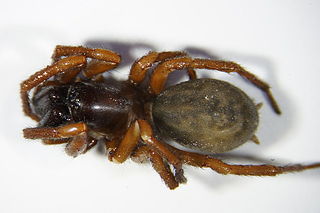
The Agelenidae are a large family of spiders in the suborder Araneomorphae. Well-known examples include the common "grass spiders" of the genus Agelenopsis. Nearly all Agelenidae are harmless to humans, but the bite of the hobo spider may be medically significant, and some evidence suggests it might cause necrotic lesions, but the matter remains subject to debate. The most widely accepted common name for members of the family is funnel weaver.

Crevice weaver spiders (Filistatidae) comprise cribellate spiders with features that have been regarded as "primitive" for araneomorph spiders. They are weavers of funnel or tube webs. The family contains 18 genera and more than 120 described species worldwide.

Dictynidae is a family of cribellate, hackled band-producing spiders first described by Octavius Pickard-Cambridge in 1871. Most build irregular webs on or near the ground, creating a tangle of silken fibers among several branches or stems of one plant.

Xysticus is a genus of ground crab spiders described by C. L. Koch in 1835, belonging to the order Araneae, family Thomisidae. The genus name is derived from the Ancient Greek root xyst, meaning "scraped, scraper".

Synagelides is a genus of Asian jumping spiders that was first described by W. Bösenberg & Embrik Strand in 1906. This genus and Agorius are separated as a genus group, sometimes called subfamily Agoriinae, but more recently downranked to tribe Agoriini of the Salticoida clade in subfamily Salticinae.

Cheiracanthium, commonly called yellow sac spiders, is a genus of araneomorph spiders in the family Cheiracanthiidae, and was first described by Carl Ludwig Koch in 1839. They are usually pale in colour, and have an abdomen that can range from yellow to beige. Both sexes range in size from 5 to 10 millimetres. They are unique among common house spiders because their tarsi do not point either outward, like members of Tegenaria, or inward, like members of Araneus), making them easier to identify.

Atypus, also called purseweb spiders, is a genus of atypical tarantulas first described by Pierre André Latreille in 1804. It occurs in Eurasia, with one species reaching into North Africa. Only three of the described species occur in Europe: A. piceus, A. affinis, and A. muralis. Specimens from the USA formerly known as A. snetsingeri represent an introduced population of A. karschi.

Nigma is a genus of cribellate araneomorph spiders in the family Dictynidae, and was first described by Pekka T. Lehtinen in 1967. They have a wide distribution, including Eurasia, North America, and Northern Africa. N. walckenaeri is one of the biggest members of the Dictynidae, growing up to 5 millimetres (0.20 in) long. They are translucent green and sometimes have red or black markings on the abdomen.

Clubiona is a genus of sac spiders that was first described by Pierre André Latreille in 1804.

Coelotes is a genus of funnel weavers first described by John Blackwall in 1841. A large number of species are found throughout Europe and Asia.

Hahnia is a genus of dwarf sheet spiders that was first described by C. L. Koch in 1841.

Sudesna is a genus of cribellate araneomorph spiders in the family Dictynidae, and was first described by Pekka T. Lehtinen in 1967.

Ebrechtella is a genus of crab spiders that was first described by Friedrich Dahl in 1907.
Draconarius is a genus of Asian funnel weavers first described by S. V. Ovtchinnikov in 1999.












